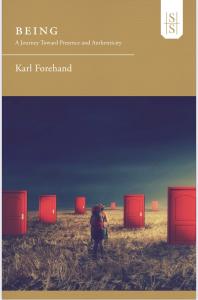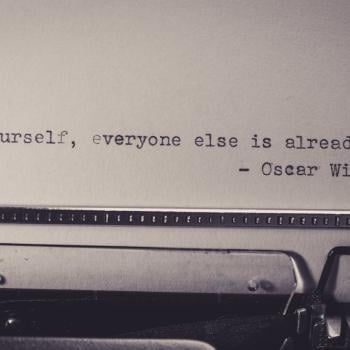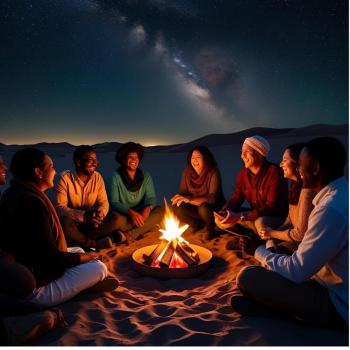
Last year, Laura and I wrote a book called “Out Into the Desert.” We decided to make it into an e-book and share it for free. It’s available on our website for download. But, I’m not writing this to sell books, even though my new book called “Being” will be out May 11th. See how I snuck that in?
In our e-book about thriving outside of organized religion, we decided to include a chapter about finding our voice. I was specifically including it to let Laura talk about finding her voice in the desert outside of Christianity. Our denomination was very “complementarian” and generally didn’t allow women to preach or hold positions of authority over men. It was absolutely true that her voice was silenced in that system, but we also discovered something interesting.

I always assumed that pastors should be the last to complain about not having a voice. After all, they get to say what they think every Sunday. They write articles for the church newsletter and often write articles in the newspaper and speak at community events. Certainly they would be one group of people that is heard quite consistently. I knew that the pastor’s wife was silenced by a host of factors, but doesn’t the pastor get to use his voice all the time.
Once, we left organized religion, some of the blinders began to slowly be removed from our eyes. We were somewhat like a person in a foreign land — slowly scanning the horizon and adjusting out glasses to see more clearly what was happening around us.
Upon careful examination, I realized that I really only spoke as a pastor within some pretty narrow guidelines. I was telling the people what I thought, but it was almost exclusively the things we already agreed on. What felt like “stepping on their toes,” was more like reminding them of what they already believed in new and creative ways.
Even though I felt I was expressing my true thoughts — I wasn’t really finding my voice — because, when I did found my voice and it was different that theirs, they reacted rather strongly. Inside organized religion, even a small divergence from established beliefs can make the congregants uneasy.
The reason I bring this us is not to change the established religious system. That system will change or grow or die on it’s own initiative. My message is for those in the desert outside the walls of the church. I want us to do better when we meet fellow travelers on this road.
When we meet someone that is finding their voice, maybe for the first time, I hope our first reaction is not correct them. Especially if they were a pastor, they may have wounds from being bridled and managed by well-meaning congregations and organizations. Years of conditioning taught them to stay within well-worn paths and now that they are taking a chance and truly saying what they feel, I hope we can encourage them.
The opportunity to say what we truly think and feel is liberating. I hope we enable that in others by encouraging them to speak and then not managing what they say for our own comfort. Maybe we can learn to say things like, “I’m glad you are able to express what you think and feel,” instead of reigning in THEIR beliefs and feelings to be more comfortable for us.
At first, when we wander out into the desert, it seems like no one is listening. We wonder if it does any good to sing our song if no one can hear it. Then often, the people that hear us want to correct and refine what we say to validate themselves. It’s the same story of organized religion on a new landscape.
The line in the sand we need to draw is to allow people to speak unfettered.
Pastors and pastor’s wives have a sort of PTSD from organized religion, so be kind to them.
I also pray that YOU find your voice and find your people that let you speak even when they don’t agree with you. And, when you find that liberation, I wish that you will enable someone else to find their true voice.
Be where you are, be who you are,
Karl Forehand













